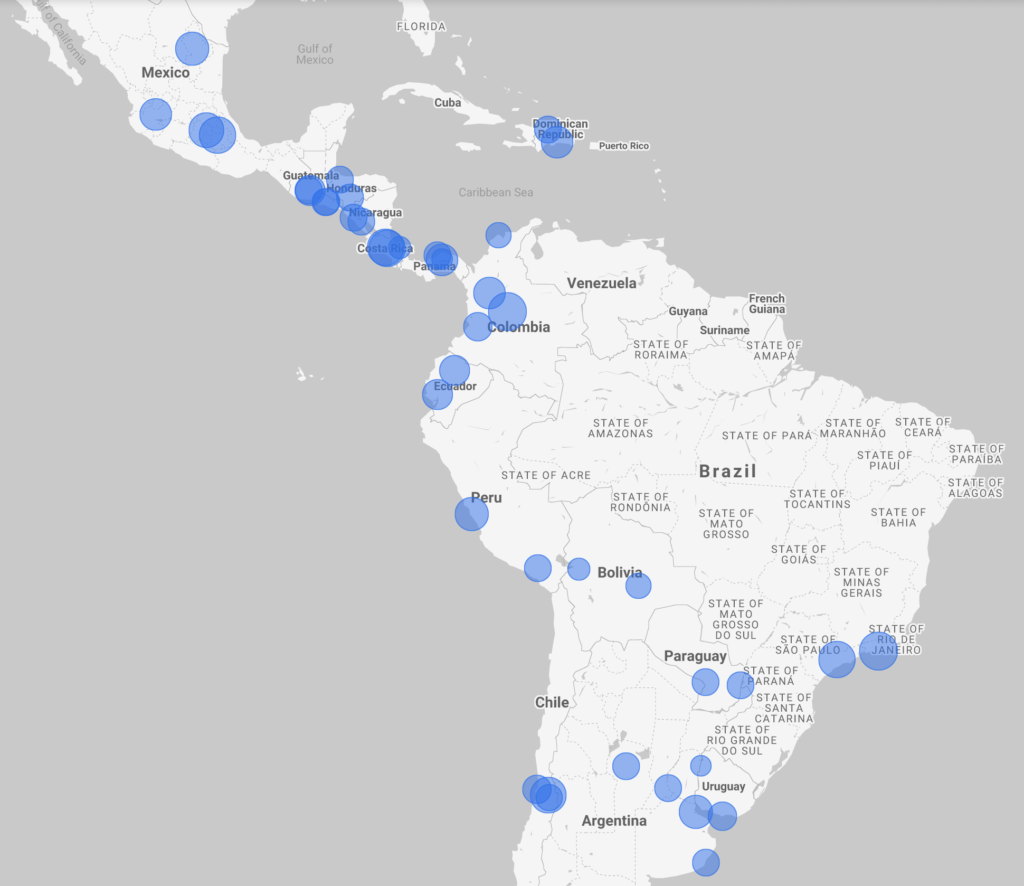Sharing Economy Index LATAM 2021
ABOUT THE INDEX:
LATAM Sharing Economy Index 2021 was created in collaboration with Somos Innovacion in order to provide consumers in Latin America and globally with concise and relevant information about the availability and accessibility of sharing economy Index services.
When it comes to sharing economy, all eyes should be on Latin America. The region’s digital lag, combined with generally low trust in government institutions and problems inherent to developing economies, such as low wages, and corruption, make it especially receptive to innovative solutions. Along with slowly generating its own tech startups (e.g. Rappi, a Colombian delivery platform currently evolving into multiple services, or Loggi, the Brazilian delivery service), Latin America has also been approaching the regulation of the existing ones in a consumer-friendly way.
According to a 2019 study conducted by Americas Market Intelligence (AMI), 56 percent of millennials in Mexico prefer Airbnb apartments and homes over hotels. In 2020, three Latin American cities – Guadalajara (Mexico), Cali, (Colombia), and Ubatuba (Brazil) respectively – made it to Airbnb’s annual Top 20 destinations list.
Ridesharing apps such as Uber have also been making the most out of the opportunity to expand their services and bring economic prosperity to Latin American consumers. Having recognised that some groups of society don’t have credit cards and/or have poor access to the internet, Uber has allowed the use of cash payments and developed Uber Lite, a version of the app tailored to serve users in underdeveloped areas.
As a global consumer advocacy group, we at the Consumer Choice Center believe that consumer choice is pivotal, and services that bring value to consumers – be it Uber, AirBnB, ShareNow, or E-scooters – should be endorsed and encouraged. Inspired by our first Sharing Economy Index and Latam Most Passenger-Friendly Airport Index, we examined 44 Latin American cities to see which are the most sharing economy friendly.
The LATAM Sharing Economy Index 2021 seeks to rank 44 biggest and most dynamic cities in Latin America to provide a valuable guide for consumers on the sharing economy services available to them. For most countries, the ranking includes the capital and a second-largest city. However, due to the particularities of the economic development and political systems of Argentina, Mexico, and Brazil and Costa Rica, we also included more cities.
For this task in Latin America the Consumer Choice Center teamed up with two regional networks:
Somos Innovación (SI) is a network formed by a group of individuals and institutions from Mexico to Argentina and Chile who are convinced that innovative solutions are the best way to inspire people to work together to solve complex problems, SI wants to be the voice of a vibrant civil society that progresses through innovation, the adoption of new technologies and human creativity.
This SI claim was corroborated by the largest innovation survey in Latin America. So much so that according to this poll of over 5,000 people in Argentina, Brazil, Chile, Colombia and Mexico, public opinion is clear: people want more innovation in their lives, whether it’s access to a more diverse range of goods and services, or creation of interesting career opportunities and better paying jobs. In brief, Latin American consumers enjoy the opportunities that innovation brings to their lives.
Latin American Liberal Network RELIAL is the most representative union of classical liberal organizations in the region. The network consists of 43 organisations, including think tanks, foundations, institutes and political parties, and has members in 17 Latin American countries. Committed to the progress and development of their countries, its members disseminate and implement liberal principles to improve the quality of life of their citizens.
Incidentally, RELIAL joined the publication of this Index due to the historical relationship with Fundación Internacional Bases, which is not only a proud member of RELIAL but also a founder of the Somos Innovación network. The partnership is an outstanding example of collaboration and synergy aimed at turning Latin America into a fertile land for innovation and testing of new solutions.
For the purposes of this Index, we considered sharing economy services in Latin America as legal, or allowed, unless they were explicitly banned through legislation.
Research Note: We strive to improve the quality of the underlying data of this index year by year, and aim to refine its methodology moving forward. We sometimes faced contradictory information and indicators provided by different online sources. We ask the readers of this index to acknowledge the difficulties of working with heterogeneous data and caution users of this index to be aware of the underlying data complications. The time span of dates ranges between 2018 and 2021.
SHARING ECONOMY LATAM - TOP 5
BENEFITS FOR CONSUMERS:
The Sharing Economy Index provides a valuable overview of many of the services that are greatly enjoyed by consumers. More is always better, and the availability of various sharing economy services ensures consumers are able to have plenty of options wherever they go. Our index gives you a glimpse into a diversity of ways your stay in a particular city can be better.
For instance, if you are considering a holiday in Puebla de Zaragoza and are a big fan of E-scooters, you might be disappointed to find out they’re banned. In a similar fashion, our index shows where you can earn extra income in Latin America by driving Uber, Cabify, or another service without having to obtain special permits. The Sharing Economy Index is a one-of-its-kind compilation of applications you can use to improve your city experience.
On the other hand, our index also deals with access to these platforms. If you are considering renting out your apartment via Airbnb or VRBO, or you want to become a rideshare driver in one of the 44 cities we examined, the Sharing Economy Index will come in handy as well. The same applies to ride-hailing services, carpooling and peer-to-peer car rentals.
It is important to stress that in terms of accessibility, we only considered requirements set by apps. In Cordoba and Rosario, for example, there is a de facto penalty for drivers engaging in ridesharing services without licence. However, ridesharing apps don’t require any.
MEDIA HITS:
- December 5, 2025
- Recent Media, Sharing Economy, Sharing Economy Index
- November 26, 2025
- Recent Media, Sharing Economy Index
- November 26, 2025
- Recent Media, Sharing Economy Index
- December 3, 2024
- Recent Media, Sharing Economy Index
- December 3, 2024
- Recent Media, Sharing Economy Index
- December 22, 2023
- Recent Media, Sharing Economy Index






